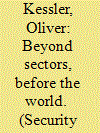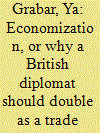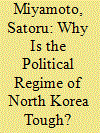| Srl | Item |
| 1 |
ID:
105944


|
|
|
|
|
| Publication |
2011.
|
| Summary/Abstract |
While security and finance are certainly different social spheres, the fact that we can detect similar shifts in both points to the existence of something that precedes these 'realities'. If finance and security are said to be different, intertwined and related, the question then arises as to what it is that constitutes the differences and similarities between them. This article argues that further inquiry into the boundary between the two leads us to understand processes of securitization and financialization as constitutive processes by which actors, behaviours, practices or communications are considered to be economic or securitized. To capture processes of financialization, the article draws on systems theory in general and the concept of functional differentiation in particular.
|
|
|
|
|
|
|
|
|
|
|
|
|
|
|
|
| 2 |
ID:
125028


|
|
|
|
|
| Publication |
2013.
|
| Summary/Abstract |
FOREIGN POLICY cannot remain frozen; it is as fluid as any other sphere of social relations. Indeed, at different stages of human history, wars, national and religious movements, technical innovations, and scientific discoveries triggered changes in world politics. In the last five years, global economy gradually recovering from the world crisis which began in 2008 has been a catalyst of such changes. Economic problems which have not yet left the stage affected and continue to affect the UK foreign policy.
|
|
|
|
|
|
|
|
|
|
|
|
|
|
|
|
| 3 |
ID:
190459


|
|
|
|
|
| Summary/Abstract |
The purpose of this paper is to examine the stability and toughness of North Korea’s political regime from the perspective of radicalism and gradualism of the market economization. Since it is believed that gradualism keeps the regime stable. I examined the hypothesis that North Korea and Cuba effectively abandoned their socialist planned economy and introduced market economization after witnessing the economic crisis in China and Vietnam during the Cold War. As a result, North Korea and Cuba experienced the economic crisis and gradual economic development after the Cold War. The socialist planned economy remained an ideal in North Korea. Therefore, market economization became gradualism because of its suppression by the ideal in North Korea.
|
|
|
|
|
|
|
|
|
|
|
|
|
|
|
|